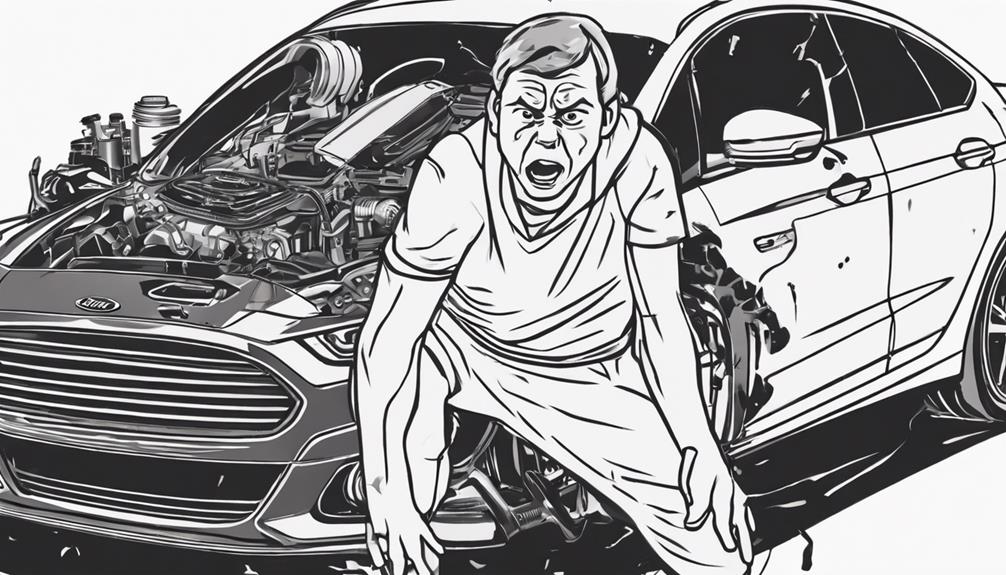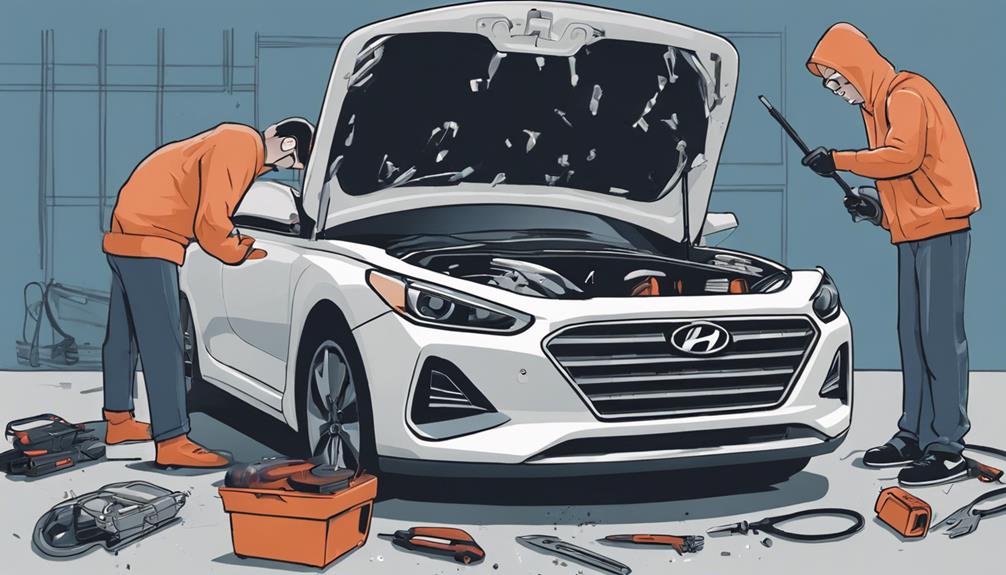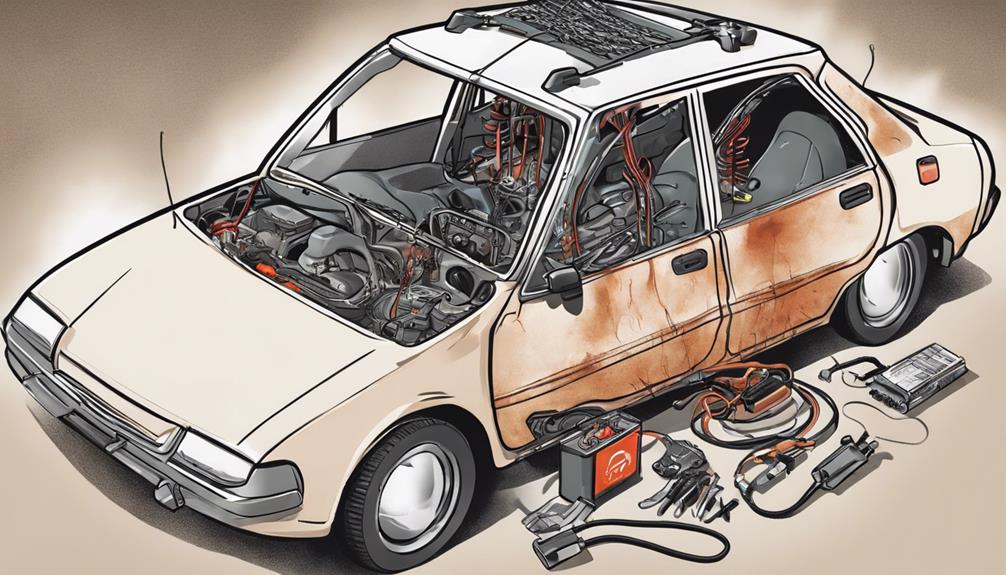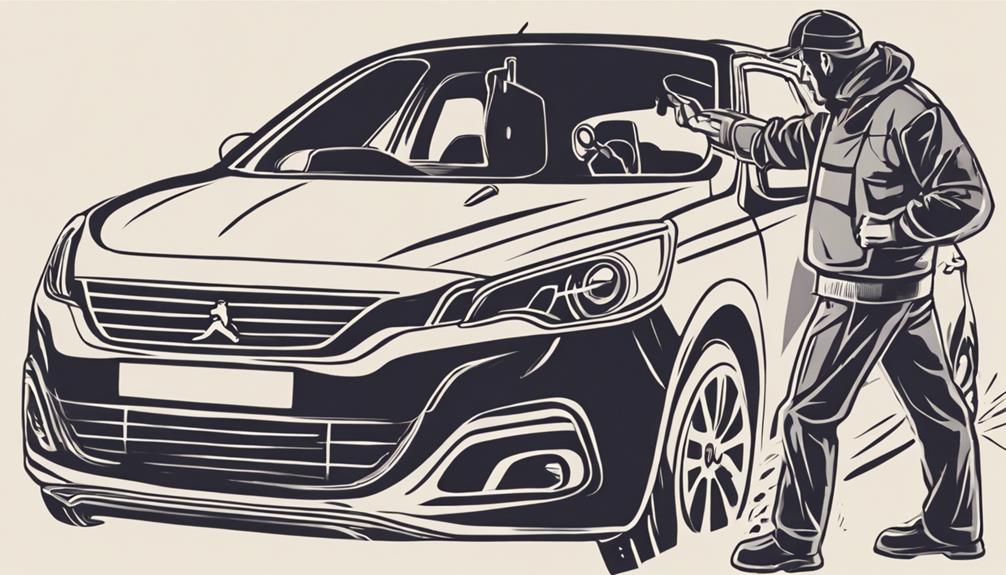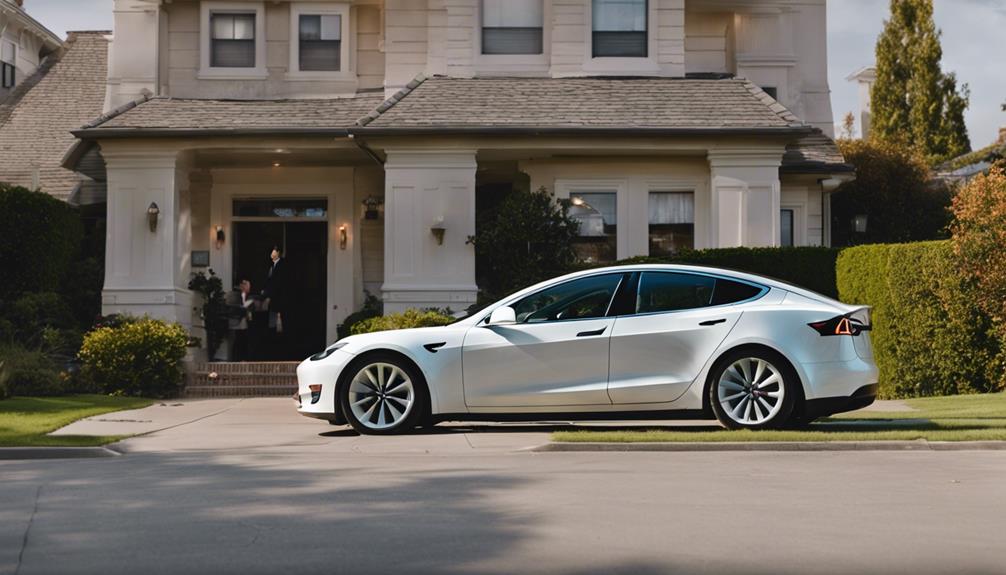If your Ford won't start, it could be due to a faulty starter relay, malfunctioning ignition coils, or a weak battery. Start by checking these components, ensuring connections are secure, and spark plugs are in good condition. Testing the starter motor, inspecting the fuel pump, and verifying the ignition system are also essential steps. If you're still facing issues, seeking professional help may provide quick solutions and expert insights tailored to your Ford's needs. Remember, a deeper understanding of the causes and fixes can help you tackle this problem efficiently.
Key Takeaways
- Check for a faulty starter motor and weak battery.
- Inspect fuel pump, filter, and ignition system components.
- Test spark plug functionality and ignition switch.
- Verify connections, circuit integrity, and starter solenoid engagement.
- Seek professional help for accurate diagnostics and quick solutions.
Common Causes of Ford Starting Issues
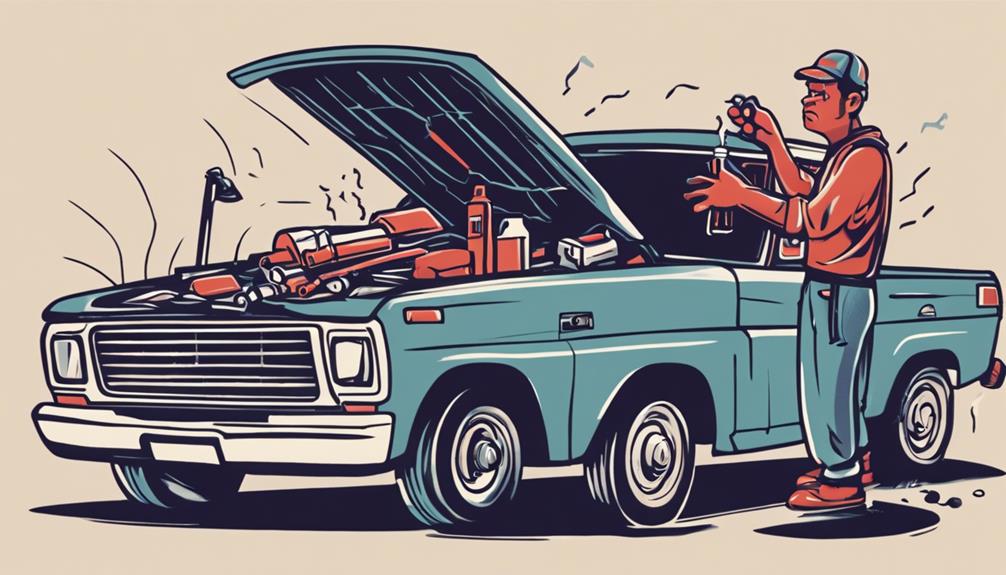
Experiencing trouble starting your Ford? One possible culprit could be the starter relay. The starter relay plays an important role in the starting process of your vehicle. It's responsible for transmitting power from the battery to the starter motor when you turn the ignition key. If the starter relay is faulty, it can prevent your Ford from starting altogether.
When you encounter starting issues with your Ford, it's crucial to evaluate the condition of the starter relay. A malfunctioning starter relay can result in a no-start situation, leaving you stranded. To resolve this problem, you may need to replace the starter relay with a new one. It's an essential fix that can make a significant difference in your Ford's starting performance.
Checking the Ignition System
Examining the ignition system is crucial for identifying potential issues that may be impeding your Ford's starting performance. To guarantee a smooth start every time, follow these steps to check your ignition system:
- Inspect Spark Plugs: Look for wear, fouling, or damage that could hinder ignition.
- Test Ignition Coils: Make sure they're functioning correctly to deliver the necessary spark to the spark plugs.
- Verify Spark Plug Wires: Check for continuity to ensure a solid electrical connection.
- Check Distributor Cap: Ensure it's in good condition for proper distribution of spark to the spark plugs.
Testing the Electrical Components
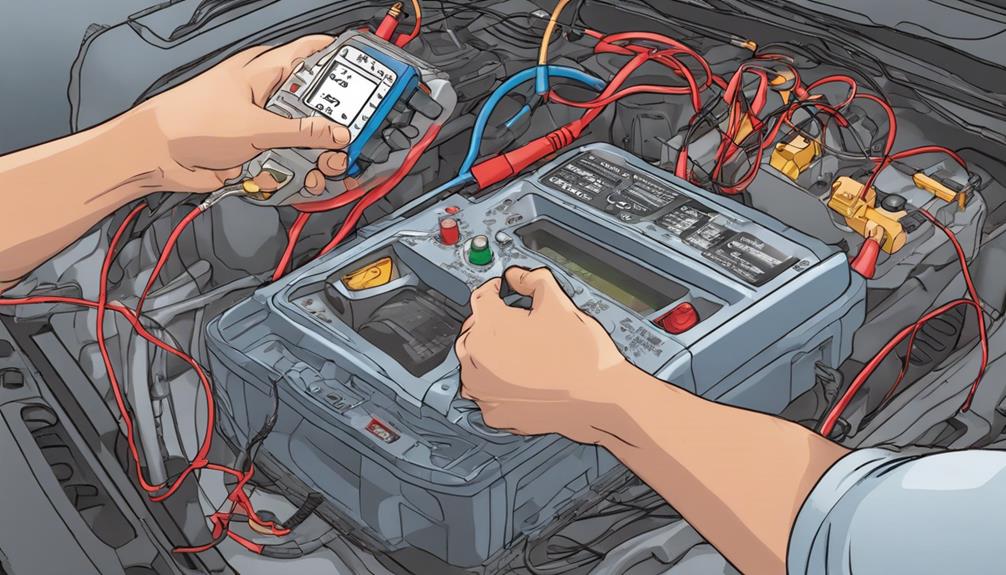
Wondering how to guarantee your Ford's electrical components are in excellent condition for a smooth start every time? To make sure a reliable start, it's important to test key components thoroughly.
Begin by checking the battery voltage to confirm it's delivering ample power. A diagnostic tool can assess the starter motor's functionality, ruling out any issues there.
Inspecting the fuel pump and filter is critical as they play a significant role in delivering fuel to the engine. A faulty fuel pump can lead to starting problems.
Verifying the ignition switch is also necessary to ensure the starter engages correctly. Additionally, scanning for engine immobilizer codes can help identify any security system glitches that might be hindering your Ford from starting.
Diagnosing PCM and ECM Problems
To effectively diagnose potential issues with your Ford's electronic control system, a thorough evaluation of the PCM and ECM is essential. Here are some key points to think about when dealing with PCM and ECM problems:
- Use diagnostic tools: Scan tools are invaluable for communicating with the PCM and ECM to pinpoint error codes or malfunctions accurately.
- Understand their roles: The PCM manages engine and transmission functions, while the ECM focuses on engine performance and emissions. Knowing their distinct functions can aid in targeted troubleshooting.
- Symptoms of trouble: Issues like poor engine performance, stalling, or difficulties starting the vehicle could indicate problems with the PCM or ECM. Being aware of these symptoms can expedite the diagnosis process.
- Repair or replace: If a faulty PCM or ECM is identified as the root cause of starting or performance issues, repair or replacement may be necessary to restore your vehicle's optimal functionality.
Inspecting the Starter and Circuits
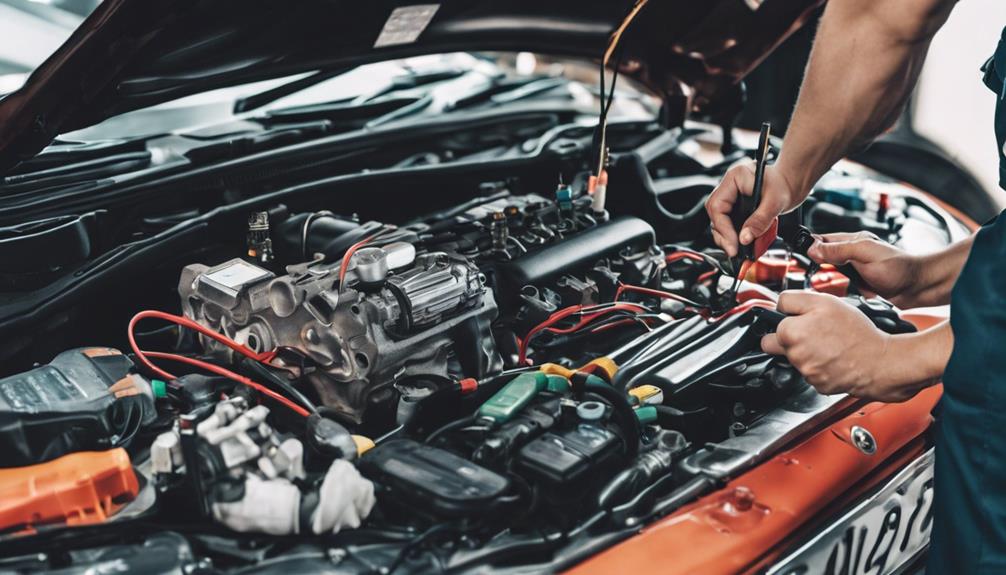
You've got to roll up your sleeves and give that starter motor a good once-over for any signs of wear and tear.
Check those circuit connections like a pro to make certain everything is snug and secure.
If you encounter any troubles along the way, don't fret – troubleshooting starter issues is all part of the fun!
Starter Motor Inspection
Examining the starter motor and circuits is crucial in diagnosing potential issues preventing your Ford from starting. Here are some key steps to take when inspecting the starter and related components:
- Look for physical damage like cracks or corrosion on the starter motor.
- Check for loose or damaged wiring connections in the starter circuits.
- Test the starter motor using a multimeter to confirm it's functioning correctly.
- Verify that the starter solenoid engages when you turn the key.
Circuit Connections Check
Examining the circuit connections for the starter and related components is crucial to identifying and resolving potential issues preventing your Ford from starting.
Commence by checking the starter motor for any wear, damage, or corrosion that could hinder its function. Confirm the starter solenoid isn't only properly connected but also functioning as it should.
Validate the voltage and current flow within the starting circuit to pinpoint any irregularities. Test the starter relay for proper operation and continuity to rule out any malfunctions.
Lastly, meticulously examine all wiring connections in the starting circuit, making sure they're secure and undamaged. By paying attention to these critical circuit connections, you can troubleshoot and resolve starting issues efficiently.
Troubleshooting Starter Issues
When troubleshooting starter issues in your Ford, examining the starter itself and its associated circuits is a crucial step to pinpointing and resolving any potential starting problems efficiently. Here's a breakdown to help you get that engine roaring to life:
- Inspect the starter: Look for any physical damage, wear, or corrosion on the connections.
- Test the starter motor: Utilize a diagnostic tool to confirm proper functionality.
- Check wiring connections: Look out for loose or damaged connections that could hinder starting.
- Verify the solenoid: Confirm it's working correctly to engage the starter motor effectively.
Addressing Battery and Grounding Issues
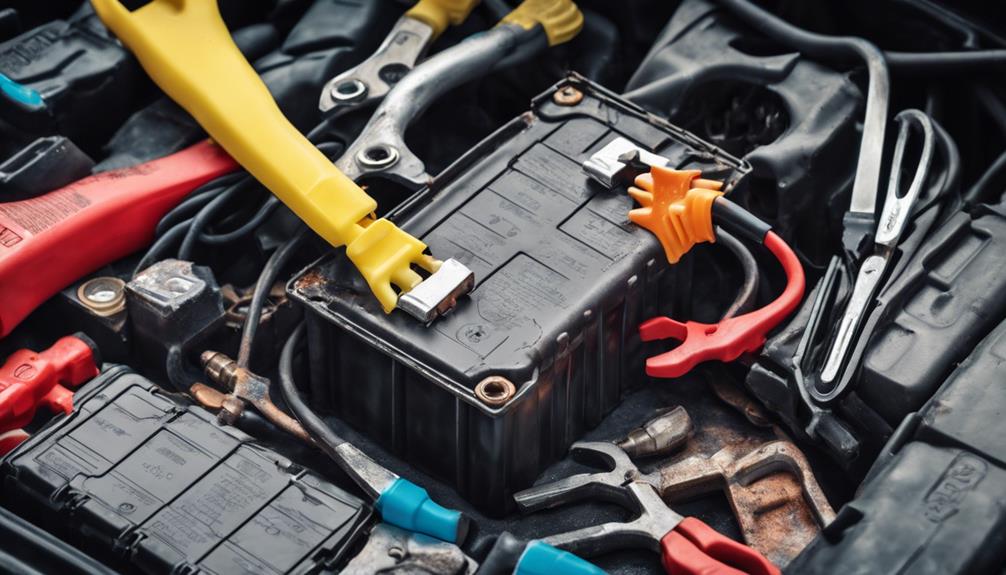
To guarantee your Ford starts reliably, tackling battery and grounding issues is essential for maintaining proper electrical flow. Checking your battery connections for corrosion and ensuring tight terminals are critical steps in preventing charging system malfunctions. Testing the battery voltage with a multimeter can help diagnose power supply issues before they escalate. Additionally, inspecting the battery for any damage or wear, such as leaks or cracks, is essential as it may indicate the need for a replacement to avoid unexpected breakdowns. Addressing grounding issues is equally important to prevent electrical problems and ensure your Ford's starting performance remains dependable.
| Battery and Grounding Maintenance | Importance |
|---|---|
| Check for corrosion on connections | Ensures strong electrical flow |
| Test battery voltage with multimeter | Determines power sufficiency |
| Inspect battery for damage or wear | Indicates need for replacement |
| Address grounding issues | Prevents electrical problems |
Performing Repair and Replacement Tasks
If your Ford is experiencing starting issues, consider performing repair and replacement tasks to address the underlying problems efficiently.
Here are some tasks you can undertake to get your Ford up and running smoothly:
- Replace Faulty Starter: A common culprit for starting issues, swapping out a faulty starter can often do the trick and get your Ford back on the road in no time.
- Clean or Replace Fuel Filter: Improving fuel delivery by cleaning or replacing the fuel filter can enhance starting performance and guarantee proper fuel flow to the engine.
- Repair or Replace Ignition Switch: Problems with starting the engine can be resolved by repairing or replacing the ignition switch, allowing for a seamless ignition process.
- Reset or Reprogram Engine Immobilizer: Sometimes, resetting or reprogramming the engine immobilizer system may be necessary to rectify starting problems and ensure smooth operation of your vehicle.
Seeking Professional Assistance

Considering the complexity of modern vehicle systems, tapping into the expertise of seasoned professionals can be a game-changer when tackling Ford starting issues. When faced with a stubborn Ford that refuses to come to life, seeking professional assistance can save you time, money, and frustration. JustAnswer offers a platform where you can connect with verified Experts like Ron, Chris, Mike V., Richard, and Cam who specialize in providing professional advice on Ford problems, including those related to fuel systems. These experts can offer tailored guidance and troubleshooting tips to help you pinpoint the exact cause of your Ford's starting troubles.
To give you a clearer picture, here's a table showcasing some of the benefits of seeking professional help through platforms like JustAnswer:
| Benefits of Seeking Professional Help |
|---|
| Quick solutions tailored to your Ford's issues |
| Expert advice on fuel system diagnostics |
| Access to a team of experienced technicians |
Frequently Asked Questions
Why Is My Ford Car Not Starting?
Having trouble starting your Ford? Check the battery, starter motor, fuel delivery, ignition switch, and engine immobilizer. These common culprits could be the key to getting your car running smoothly again.
What Would Cause My Car to Suddenly Not Start?
If your car suddenly won't start, common culprits include a dead battery, faulty starter, fuel delivery issues, ignition switch problems, or engine immobilizer malfunctions. Addressing these issues promptly can get you back on the road.
How Do You Fix an Engine That Wont Start?
When an engine won't start, troubleshoot by checking battery, fuel system, ignition components, and engine mechanics. Look for common issues like dead battery, starter problems, fuel delivery issues, and more. Keep calm and methodically diagnose the problem.
What Would Cause My Ford F-150 Not to Start?
When your Ford F-150 won't start, potential culprits include a dead battery, faulty starter, fuel delivery issues, ignition switch problems, or engine immobilizer malfunctions. Diagnostic tests and timely repairs can get you back on the road.





